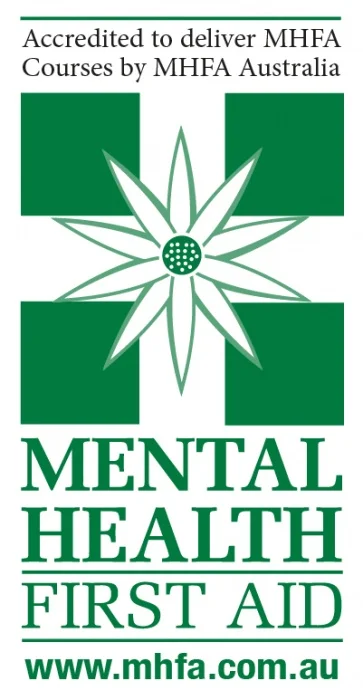Mental Health
Statistics (Australian Bureau of Statistics, 2007, National Survey of Mental Health and Wellbeing) show that one in five Australians aged 16-85 will suffer from some form of common mental illness in any year.
Furthermore, only 35% of people who meet the diagnostic criteria for a common mental illness seek professional help.
Register Your Interest for the 2017 Youth Mental Health Workshops Here
What is the Standard Mental Health First Aid (MHFA) Program?
Mental health first aid is the help provided to a person who is developing a mental health problem, or who is in a mental health crisis (e.g., the person is suicidal or has had a traumatic experience). Like physical first aid, mental health first aid is given until the person receives professional help or until the crisis resolves.
Signature Performance Group offers Standard MHFA Courses as authored by MHFA Australia, delivered by MHFA Accredited Instructors.
Course participants receive a copy of the Standard MHFA Manual to keep and a Certificate of Completion. Participants must attend the entire course in order to receive the Certificate of Completion.
Mental Health in the Workplace
Organisation and business leaders have responsibilities under Australian work health and safety laws to do whatever is reasonably practical to eliminate or minimise risks to worker’s mental and physical health. For more information, please see Safe Work Australia.
Untreated mental health conditions cost Australian employers $10.9 billion every year through absenteeism, reduced productivity and compensation claims. Managing mental health issues in the workplace and promoting and maintaining mental health and well-being in high performance work environments reduces costs and staff turnover, and increases productivity and engagement. Research by PricewaterhouseCoopers has shown that for every dollar an organisation spends on creating a mentally healthy workplace, they will receive on average a positive return on investment (ROI) of 2.3 ($2.30). The benefits are usually in improved productivity from a reduction in absenteeism, presenteeism (reduced productivity at work) and lower numbers of compensation claims.
Why Your Organisation Needs Mental Health First Aiders
Mental health problems are common - 1 in 4 people will experience an anxiety disorder and 1 in 6 people will experience depression at some stage of their lives. Throughout the course of a person’s life, it is highly likely that an individual will either develop a mental health problem or have close contact with someone who does at home or at work. MHFA provides people with skills which they will most likely use at one point in their lives.
Many people are not well informed about how to recognise mental health problems, how to respond to the person, and what effective treatments are available.
Many people with mental health problems do not seek help or delay seeking help. The longer people delay getting help and support, the more difficult their recovery can be. MHFAiders can encourage people to seek help early.
There is stigma and discrimination associated with mental health problems that MHFAiders can challenge.
People with mental health problems may at times not have insight that they need help, or may be unaware that effective help is available to them. In addition, professional help is not always easily available. Members of the public can offer immediate first aid and assist the person to get appropriate professional help and support.
Mental health first aid has been found to be effective. A number of research studies have shown that training in Mental Health First Aid results in better knowledge, attitudes and help-giving.
For detailed statistics and information on mental illness in Australia, visit: www.beyondblue.org.au
Course Outline - 12-hour Standard MHFA Course
The 12-hour Mental Health First Aid (MHFA) course teaches adults (18 years and over) how to provide initial support to adults who are developing a mental illness or experiencing a mental health crisis.
Session One
(3 hours)
Mental Illnesses
Prevalence and impact
Spectrum of interventions
Mental Health First Aid
The MHFA Action Plan
Depression
Signs, symptoms and risk factors
Interventions
Session Two
(3 Hours)
The MHFA Action Plan for Depression
Crisis first aid for suicidal thoughts and behaviours
Crisis first aid for non-suicidal self-injury
Anxiety
Signs, symptoms and risk factors
Interventions
Session Three
(3 hours)
The MHFA Action Plan for Anxiety
Crisis first aid for panic attacks
Crisis first aid for traumatic events
Psychosis
Signs, symptoms and risk factors
Interventions
Session Four
(3 hours)
The MHFA Action Plan for Psychosis
Crisis first aid for severe psychotic states
Crisis first aid for aggressive behaviour
Substance Misuse
Signs, symptoms, risk factors, interventions
The MHFA Action Plan for Substance Misuse
Crisis first aid for intoxication
Crisis first aid for medical emergencies
Continuing Professional Development (CPD) Points
Most professionals can claim attendance at a MHFA course for Continuing Professional Development (CPD) with their industry body. The Standard Mental Health First Aid Course has been endorsed for CPD points for a number of professions including: nursing, pharmacy, fitness, chiropractic and physiotherapy. In addition, for the following professionals, if a participant can link a relevant CPD learning goal to the Mental Health First Aid course, attendance can be claimed as CPD by: psychologists, social workers, teachers, dieticians, speech pathologists and lawyers in some states and territories of Australia.
Youth Mental Health First Aid Course
The Youth Mental Health First Aid Course is for adults working or living with adolescents (those aged between 12 and 18 years), however, the course can be relevant for those helping people who are a little younger or older. This course is particularly suitable for parents, teachers, sports coaches and youth workers.
The course teaches adults how to assist adolescents who are developing a mental health problem or in a mental health crisis. Course participants learn about adolescent development, the signs and symptoms of the common and disabling mental health problems in young people, where and how to get help when a young person is developing a mental illness, what sort of help has been shown by research to be effective, and how to provide first aid in a crisis situation.
This course will be available from 2017.


